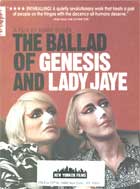
The Ballad of Genesis and Lady Jaye 2011
Distributed by New Yorker Films, 220 East 23rd Street, Suite 409, New York, New York 10010; 212-645-4600
Produced by Marie Losier, Steve Holmgren, Martin Marquet
Directed by Marie Losier
DVD , color, 70 min.
General Adult
Art, Gender Studies, Music, Theatre
Date Entered: 06/17/2013
Reviewed by Monique Threatt, Indiana University, Herman B Wells Library, Bloomington, INAt the heart of this amazing documentary feature is a love story between performance artist and musician Genesis Bryer P-Orridge, and performance artist Lady Jaye Breyer P-Orridge. Filmed over several years and narrated by Genesis (nee Neil Andrew Megson), the film communicates his experiences as being a target for bullies at a conservative public school in Birmingham, England, performing with experimental music groups Throbbing Gristle and Psychic TV, his relationship and marriage to Lady Jaye in 1995, and ultimately, life after Lady Jaye.
According to Wikipedia, “Psychic TV (sometimes spelled Psychick TV) or PTV is a video art and music group that primarily performs psychedelic, punk, electronic and experimental music. The band was formed by performance artist Genesis P-Orridge and video director Peter Christopherson (after the breakup of Throbbing Gristle) with Alex Fergusson, musician and producer (a key member of Alternative TV for whom P-Orridge had played percussion).” Based on a blog entry, Genesis claims that "Psychic TV is a video group who does music unlike a music group which makes music videos."
Unfortunately, little is revealed about Lady Jaye’s origins. She runs away from home at 14 and escapes to “Alphabet City,” a seedy neighborhood in the East Village of New York City. She soon takes part in adult theatrical performances, and becomes a part-time dominatrix. Genesis eyes her at a friend’s house in New York, while on vacation from California, and falls madly in love. He soon finds that he cannot live without her, marries her, and strongly suggest that she join Psychic TV which she hesitantly accepts, and is allowed to contribute samples and performance art onstage.
Self-labeled as pandrogenists, Genesis and Lady Jaye reject gender assignment, and adopt a genderless ideology and body, which happens to be female in appearance. Heavily influenced by the teachings of William S. Burroughs and Brion Gysin and their concept of “cut-ups” and the “Third Eye,” Genesis believes that by literally “cutting-up their bodies to create a third, conceptually more precise body will bring about more similarities rather than separation.” He states that pandrogeny is needed for survival. To follow through with this train of thought, he and Lady Jaye undergo cosmetic surgery and receive breast implants to uncannily look more like each other.
After the untimely death of Lady Jaye in 2007, allegedly due to untreated cancer, the band continues to perform and tour with heavy hearts. They also manage to publish the sold-out, Psychic Bible. The film is, at its core, a love story, retrospective video diary, and memoriam to Lady Jaye through the use of archival footage and photographs. Music by Psychic TV lends itself to an excellent soundtrack. I highly recommend this film with reservations, due to images of nudity, for public and academic media collections.